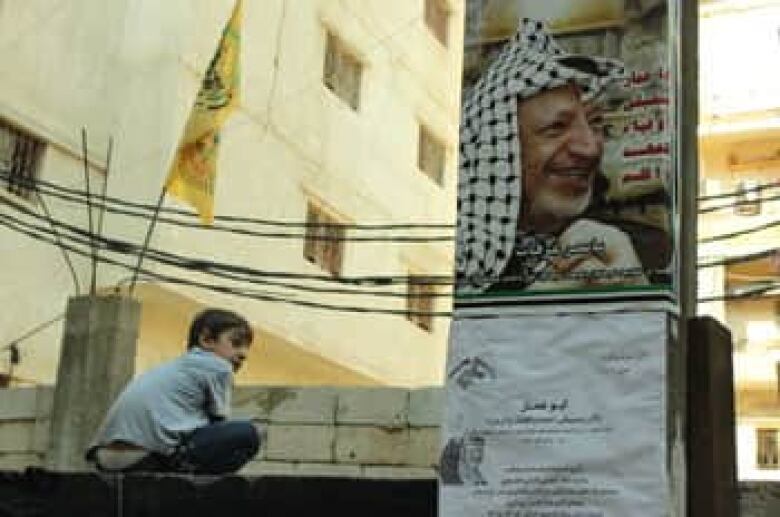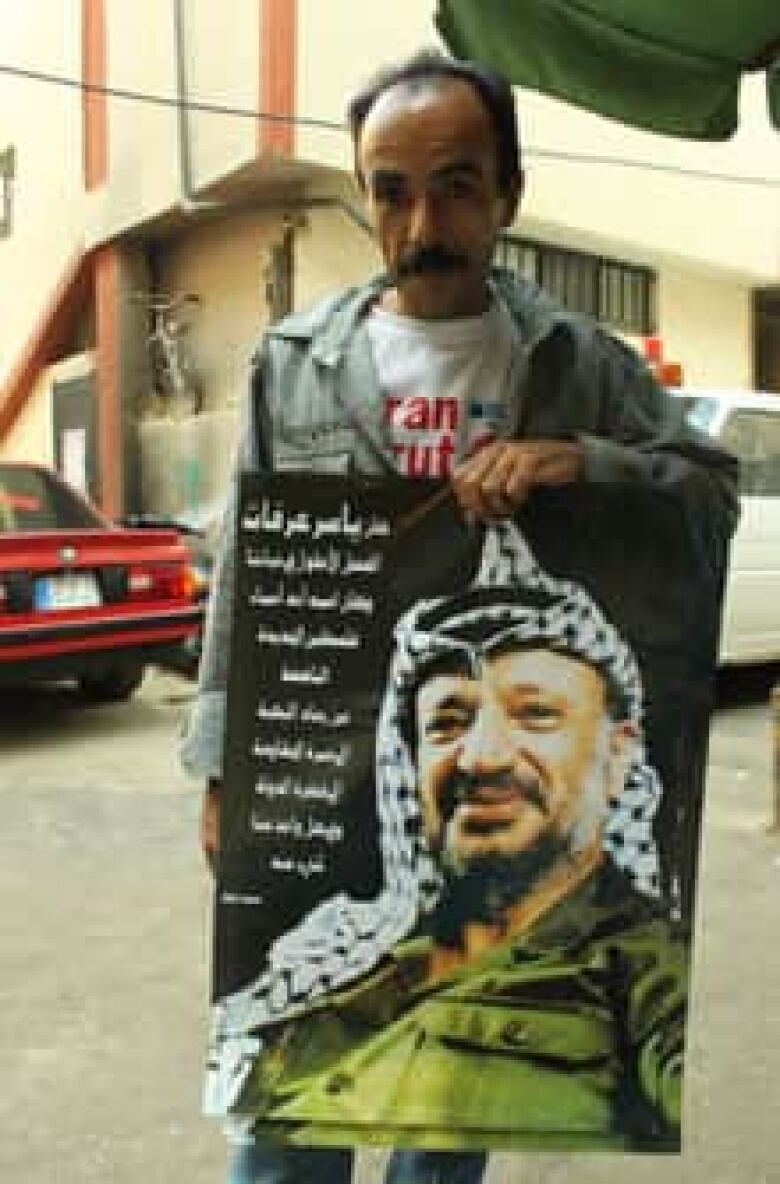DAY 8: Talking about Arafat
Nov. 12, 2010 It was the evening of Nov. 4, 2004. Longtime Palestinian leader Yasser Arafat was ailing, and his powers as Palestinian Authority president had just been transferred to his prime minister a sure sign he wouldn't last much longer.
I walked into one of Shatila's alleys that night to gauge Palestinian reaction, and I came across a group of men smoking in the dark. It took a bit of negotiation, but they agreed to share their thoughts on the eve of Arafat's death.

"It's a sensitive moment," a man by the name of Majid al-Ali told me at the time. "There's real fear about our future and unity."
One week later, the longtime head of the Fatah party and the Palestine Liberation Organization, died in a Paris hospital of an ailment never made public. I covered Arafat's official funeral later that week in Cairo, after which his body was flown by helicopter back to his compound in Ramallah in the West Bank, the seat of the Palestinian administration, for an emotional burial.
Nahlah Ayed's Shatila blog
- Day 1: En route to Beirut
- Day 2: Small signs of progress
- Day 3: Sharing details, but with dignity
- Day 4: Artifacts of exile
- Day 5: Shatila's space problem
- Day 6: Camp politics
- Day 7: A litany of woes
- Day 8: Talking about Arafat
- Day 9: Dreaming big in Shatila
- Day 10: Living with the trauma of camp life
- Day 11: Celebrating sacrifice in Shatila
- Day 12: Stuck in Shatila
Every year since, the people of Shatila along withmany Palestiniansthroughout the region and beyond have marked the anniversary. Schools were closed in Shatila yesterday, and the camp suddenly acquired many more posters of the inscrutable leader in his trademark Palestinian scarf, or kuffiyeh, and spotty beard.
Shatila occasionally provided shelter to Arafat, back when he was based in Lebanon in the 1970s and early 1980s and was in the thick of the Lebanese civil war, and the threats against his life reportedly forced him to move nightly.
Today, Shatila's much-weakened arm of Fatah put on a ceremony in his honour. I didn't have the chance to attend, but I dropped by the camp after dark to once again talk about Arafat this time about his lasting legacy here.
Shatila in the evening seems far more populous than in the daytime. It was Friday tonight typically quite a social night but the evening buzz is also partly because the men have returned from work and partly because when it is warm, as it was tonight, people (largely men) tend to sit outside to socialize and escape their unwelcoming, dark homes.

It is a different Shatila than that of the daytime. Walking into the camp, several cockroaches scurried under my feet. Someone unleashed a peal of fireworks nearby. Men played backgammon and chess, chasing every move with a sip of coffee or tea. Teenage boys hid in the parking lot, smoking cigarettes.
I stopped at a refreshment stand on a commercial road, where a group of men who looked to be in their 40s were chatting in the feeble light of a single light bulb, straining to hear each other over the television sitting on the counter. It took almost no effort to start an Arafat conversation.
"We were born with Arafat as leader," Mahmoud Hashem told me as he served a tiny cup of strong coffee to a customer in an undershirt waiting on a scooter.
"Even now, six years later, I cannot believe that (current PLO leader) Mahmoud Abbas took his place."
Not all Palestinians approved of Arafat's various approaches to the Mideast conflict over the years or his unwillingness to share power. But many agree he had a singular ability to unify the players in the fractious Palestinian political landscape.

"His best quality was that he prevented Palestinian-Palestinian infighting," Hashem continued. "He knew the game and held everyone together. Of course, after he died, we were like the rosary that came apart."
Still, the men told me that among all the factions represented, even in a camp as tiny as this one, Arafat's very image his omnipresent military uniform and kuffiyeh conjures up the core of their dreams: the right of return.
He endures as the grandfather of their cause in its many manifestations, even though he failed to deliver on a homeland for Palestinians either by force or through negotiations, both of which he tried.
"He's a big national symbol," said Abu Abdallah, a man standing next to Hashem who identified himself as a member of Islamic Jihad, a far more militant Palestinian organization than Fatah.
"I disagreed with his politics we are like north and south, he and I but I still respect him."
Ordinary people here miss a leader who knew how they lived, in what awful conditions. Many complain that doesn't exist now with the current leadership in Ramallah.
"He could understand everyone," Hashem told me. "When he went, we all lost."
Many here like to quote a revered Palestinian poet, Mahmoud Darwish, whenever Arafat's name comes up. It happened in conversation yesterday with Khalil Omar, who fetched a poster to show me the oft-cited line of poetry about their former leader.
It says: "In every one of us, there's something of him."
Hashem brought up the same notion tonight.
"Arafat is still here," he concluded.
[IMAGEGALLERY galleryid=131 size=large]













_(720p).jpg)


 OFFICIAL HD MUSIC VIDEO.jpg)
.jpg)



























































































